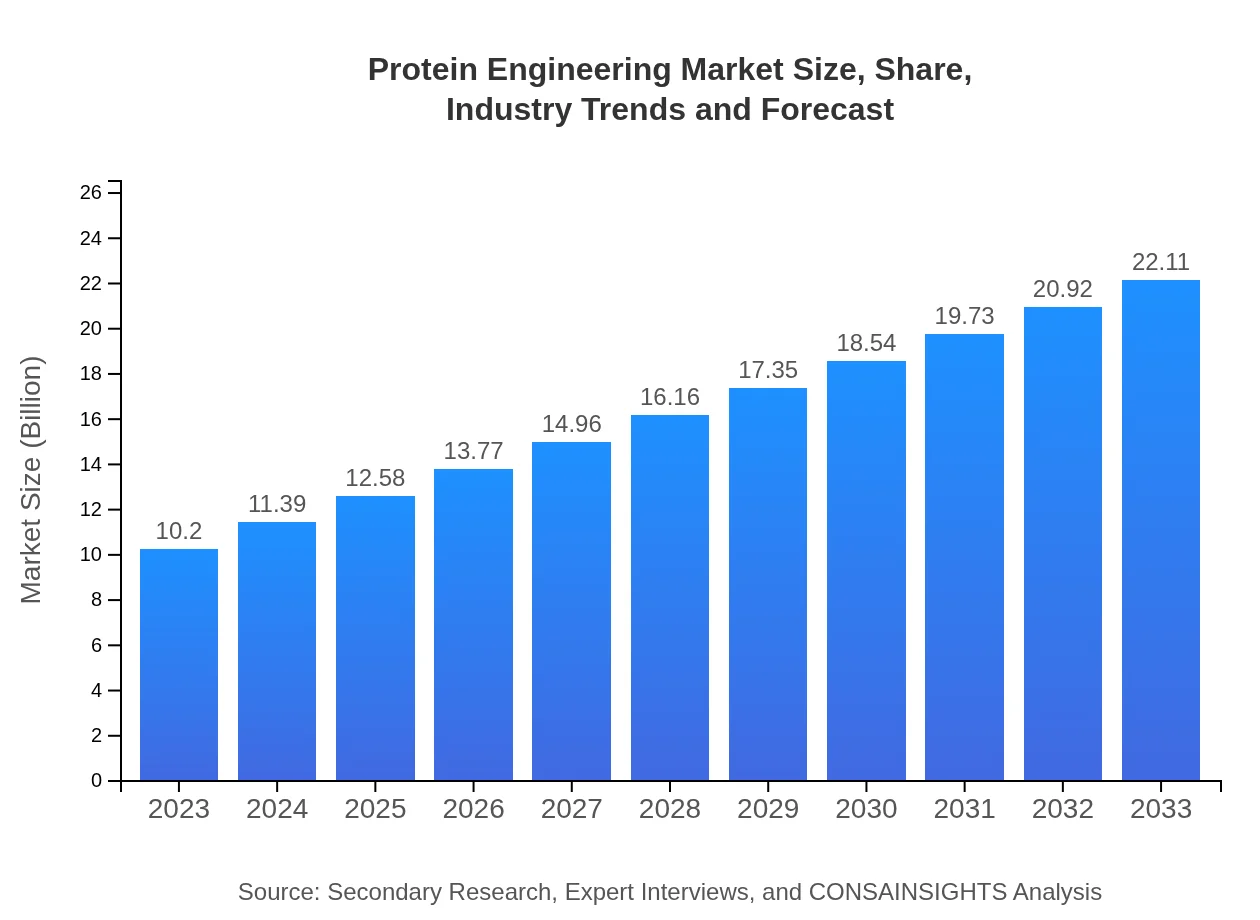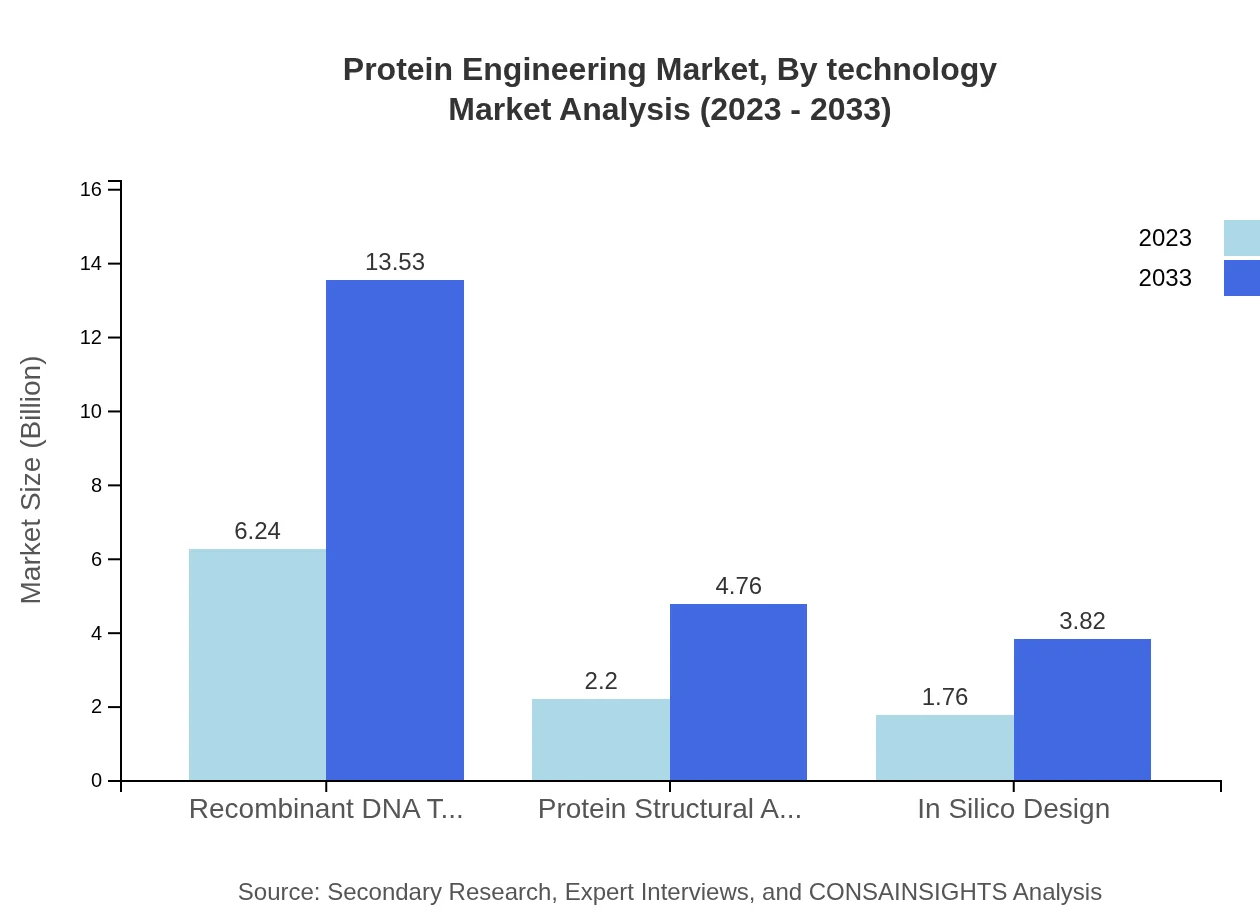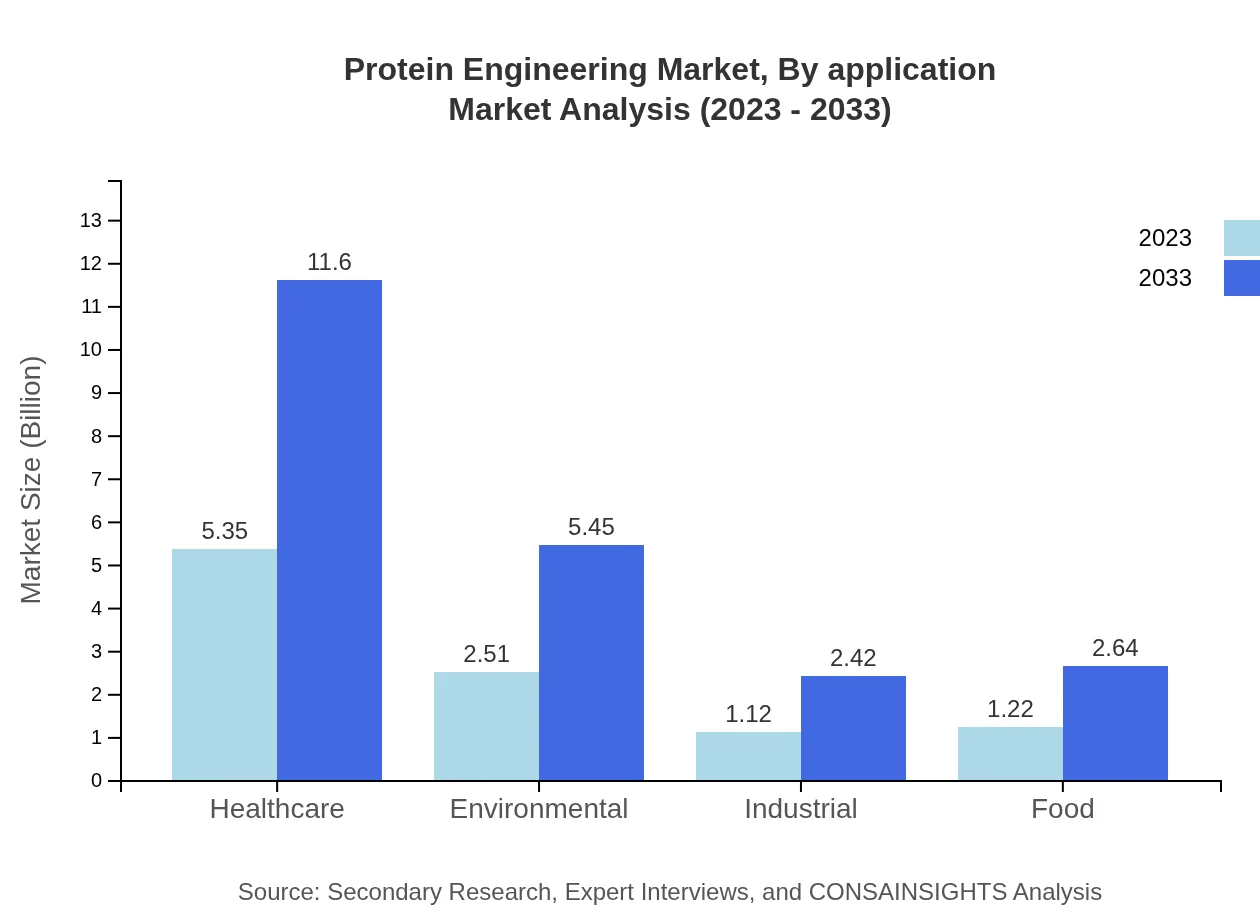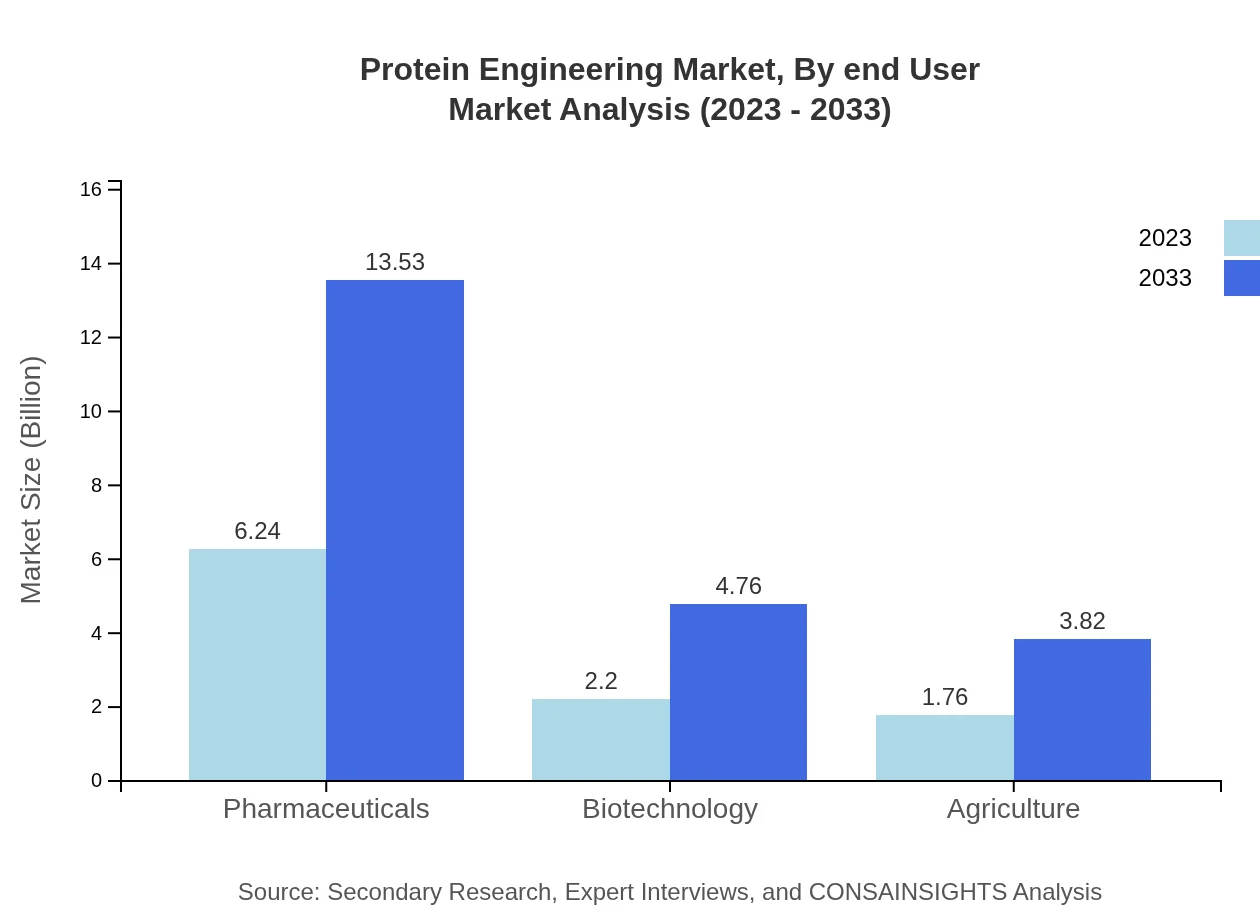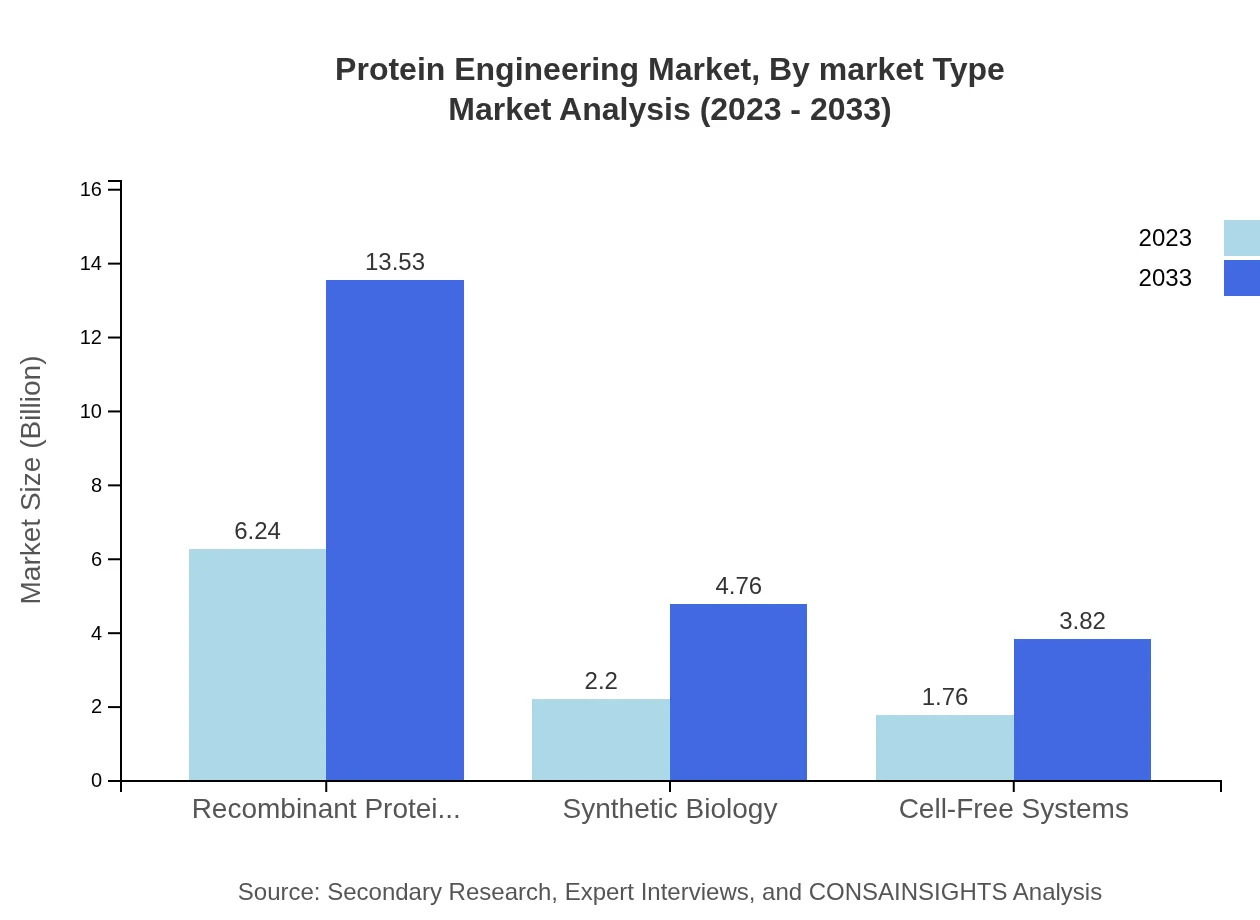Protein Engineering Market Report
Published Date: 31 January 2026 | Report Code: protein-engineering
Protein Engineering Market Size, Share, Industry Trends and Forecast to 2033
This report presents a comprehensive analysis of the Protein Engineering market, covering key insights, trends, and forecasts for the period from 2023 to 2033. It includes detailed assessments of market size, growth rates, regional analysis, and the competitive landscape.
| Metric | Value |
|---|---|
| Study Period | 2023 - 2033 |
| 2023 Market Size | $10.20 Billion |
| CAGR (2023-2033) | 7.8% |
| 2033 Market Size | $22.11 Billion |
| Top Companies | Amgen, Biogen, Roche, Genentech, Bristol Myers Squibb |
| Last Modified Date | 31 January 2026 |
Protein Engineering Market Overview
Customize Protein Engineering Market Report market research report
- ✔ Get in-depth analysis of Protein Engineering market size, growth, and forecasts.
- ✔ Understand Protein Engineering's regional dynamics and industry-specific trends.
- ✔ Identify potential applications, end-user demand, and growth segments in Protein Engineering
What is the Market Size & CAGR of Protein Engineering market in 2023?
Protein Engineering Industry Analysis
Protein Engineering Market Segmentation and Scope
Tell us your focus area and get a customized research report.
Protein Engineering Market Analysis Report by Region
Europe Protein Engineering Market Report:
The European market is healthy, with a size of $3.24 billion in 2023, estimated to grow to $7.03 billion by 2033. The region’s strong regulatory support and investment in biotechnological research contribute significantly to market growth.Asia Pacific Protein Engineering Market Report:
In the Asia Pacific region, the market was valued at approximately $1.99 billion in 2023, projected to reach $4.31 billion by 2033. The rapid growth in emerging economies, coupled with increased investments in biotechnology education and infrastructure, enhances regional growth prospects. China’s focus on biopharma development is expected to drive market dynamics.North America Protein Engineering Market Report:
North America, holding a market size of $3.31 billion in 2023, is projected to expand to $7.17 billion by 2033. The region is a leader in biopharmaceutical innovation, with several key players operating in tandem with academic institutions to foster research and commercialization.South America Protein Engineering Market Report:
South America exhibited a market size of $0.31 billion in 2023, expected to grow to $0.68 billion by 2033. Investment in agricultural biotechnology is on the rise, aimed at improving crop resilience and yield, creating significant opportunities for protein engineering.Middle East & Africa Protein Engineering Market Report:
The Middle East and Africa region generated a market size of $1.35 billion in 2023, expected to evolve to $2.92 billion by 2033. Growth is encouraged by increasing healthcare investments and research initiatives aimed at addressing region-specific health challenges.Tell us your focus area and get a customized research report.
Protein Engineering Market Analysis By Technology
Technological advancements are fundamental to the growth of the Protein Engineering market. Key technologies include recombinant DNA technology, holding a significant share due to its extensive application in protein therapeutics. Other notable technologies include synthetic biology and protein structural analysis, which are gaining traction for their potential to revolutionize protein design and production.
Protein Engineering Market Analysis By Application
The application of engineered proteins spans pharmaceuticals, biotechnology, agriculture, healthcare, and environmental sectors. Pharmaceuticals are the largest application segment, accounting for 61.2% of the market share in 2023, as engineered proteins become vital in developing targeted therapies for various diseases.
Protein Engineering Market Analysis By End User
End-users of the Protein Engineering market include academic research institutes, pharmaceutical companies, biotechnology firms, and agricultural stakeholders. The pharmaceutical segment dominated in 2023 due to ongoing R&D to develop novel drugs and therapeutics.
Protein Engineering Market Analysis By Region
Global Protein Engineering Market, By Region Market Analysis (2023 - 2033)
The Protein Engineering market is segmented regionally into North America, Europe, Asia Pacific, South America, and the Middle East and Africa. Each region possesses unique growth drivers, shaped by local industry developments and regulatory frameworks.
Protein Engineering Market Analysis By Market Type
Market types can be classified into therapeutic proteins, enzymes, and diagnostic proteins. Therapeutic proteins take precedence in market size and application, particularly in addressing chronic diseases through biologics.
Protein Engineering Market Trends and Future Forecast
Tell us your focus area and get a customized research report.
Global Market Leaders and Top Companies in Protein Engineering Industry
Amgen:
A leading biotechnology company focused on discovering, developing, and delivering innovative human therapeutics, including engineered proteins.Biogen:
Known for its contributions to neuroscience and biotechnology, Biogen develops advanced therapies leveraging protein engineering techniques.Roche:
A global healthcare company that integrates detailed research on protein engineering to develop and manufacture innovative therapeutics for diverse medical conditions.Genentech:
A pioneer in biopharmaceutical developments, Genentech uses protein engineering to create medicines targeting serious diseases, primarily in oncology.Bristol Myers Squibb:
Engaged in the discovery and development of innovative medicines, including engineered proteins for therapeutic applications.We're grateful to work with incredible clients.









FAQs
What is the market size of protein Engineering?
The global protein engineering market size is projected to reach $10.2 billion by 2033, with a CAGR of 7.8% from 2023. The market is anticipated to expand significantly, driven by advancements in biotechnology and increasing demand for protein-based therapeutics.
What are the key market players or companies in the protein Engineering industry?
Key players in the protein engineering market include major biopharmaceutical firms, biotechnology companies, and research institutions that focus on innovative therapeutic solutions and recombinant protein development, affirming the industry's competitive landscape.
What are the primary factors driving the growth in the protein Engineering industry?
Growth in the protein engineering industry is driven by rising incidences of chronic diseases, advancements in genomics and proteomics, increased funding for biotechnology research, and a growing demand for protein-based drugs and therapeutics.
Which region is the fastest Growing in the protein Engineering?
The fastest-growing region in the protein engineering market is expected to be Europe, with market size projected to rise from $3.24 billion in 2023 to $7.03 billion by 2033. North America and the Asia Pacific are also significant contributors to market growth.
Does ConsaInsights provide customized market report data for the protein Engineering industry?
Yes, ConsaInsights offers customized market reports tailored to specific needs, including in-depth data analysis and insights for the protein engineering industry, catering to particular business goals and market dynamics.
What deliverables can I expect from this protein Engineering market research project?
Deliverables from the protein engineering market research project include comprehensive market analysis reports, segmentation insights, growth forecasts, competitor analysis, and customized data sets relevant to industry trends and market opportunities.
What are the market trends of protein Engineering?
Current trends in protein engineering include a shift towards synthetic biology applications, increased focus on personalized medicine, advancements in recombinant DNA technology, and the development of novel therapeutic proteins tailored to patient needs.

